Are you a digital nomad who lives all over the globe? And do you need an international health insurance policy that’ll cover you in countries around the world? Then read on for the 7 best & cheapest options for international travel insurance for digital nomads!
You probably already know that health insurance is essential – not only for your own well-being and health, but also to be allowed to enter a new country (whether to travel or to live).
So to help you with your search, I’ve created a list below with the best international health insurance plans for digital nomads (you know, those crazy people who work online from anywhere in the world!).
The options below should help you find the best health insurance policy based on what you’re looking for and your budget!
But first…what is a digital nomad?
First things first, let’s understand a bit more about this unique lifestyle.
Although the idea of digital nomads has been around for a few years, it’s seen a significant increase during the COVID-19 pandemic. As many people transitioned to working from home, the search for more flexible schedules and proximity to nature grew.
These remote workers who then chose to bring their work with them while they traveled and worked overseas are called digital nomads. After all, since all they need is a laptop and WiFi to get paid, why not work and travel the world at the same time?
And for those who work in creative positions – like writers or designers. What could be better than working with a seaside view on a beautiful beach?
(Actually, confession here. I can promise you that working at the beach isn’t as enjoyable nor practical as it seems. But although working at a beach may not be that great, what IS great is being able to see the beach from where you’re working, or being able to visit the beach easily after work )
There’s even a few countries that have seen this as an opportunity to stimulate local tourism, boost the economy, and make happy travelers! Also, there are some countries cheaper to be a digital nomad than others.
For example, countries like Costa Rica, Bermuda, Barbados, Portugal, Georgia (the country, not the state!), and Estonia all offer digital nomad visas or visas for individuals who are now working remotely because of the pandemic.
So now that you know a bit more about digital nomads, let’s get to why you need to have health insurance before you venture off into the world!

Why do I need international health insurance as a digital nomad?
When planning a trip, health insurance is one item that many travelers forget to prioritize. But for someone who is going to live in another country, it’s very important that your insurance is up-to-date!
For one, healthcare overseas can be very expensive and, depending on where you are, you may not be covered by any healthcare plan you have back home.
You also have to take into account the risks of traveling in a place you don’t know, trying new things, and running into those classic travel “hiccups” (food poisoning, anyone?). And when it comes to your health, you don’t want to rely on luck.
But that’s not all. Here are a few more reasons to get a health insurance plan BEFORE you leave home.
You’ll probably need an insurance policy to get a resident or digital nomad visa
In order to get a visa (resident, work, or even student!), most countries will require you to show proof of insurance.
And even if you know that the country you’re moving to has a free public healthcare system, make no mistake: you won’t have access to it when you first arrive and will need your own health insurance plan anyways!
We found this out the hard way with Nikki when we moved to Sweden. To qualify for her residence card, she had to have proof of insurance (she used the first company on the list below). But once she got her residence card, she got access to the Swedish public health system and no longer needed to use her insurance anymore!
(Thankfully, she was able to cancel the policy for the months she didn’t use it)
An international health insurance policy protects your health & well-being
Sure, it’s true that not all countries will require you to have expat or digital nomad insurance to enter the country.
But as I explained above, you’ll be arriving in a new and likely unknown destination, which can make you more vulnerable to health or safety issues. So even if you’re not required to have a policy by law, it’s always important to take care of your own health and make sure you have medical coverage when you need it.
A health insurance policy gives you access to better quality medical care
The truth is that we only know how something actually works when we see it in action.
So even if you know that the country you’re moving to has a public healthcare system, you won’t know exactly how it works until you get there. Especially if you need a particular type of health coverage.
But with health insurance, you can rest easy with the assurance that no matter what happens, you’ll have access to high-quality healthcare. So you don’t need to worry about emergencies happening to you or your family.
Plus, in most countries in the world, the private healthcare system is better than the public. And with an insurance policy, you can easily access the private system (which may be very expensive without insurance!).
A health insurance policy can save you money
There’s a good reason that health insurance is a requirement in many countries.
As I mentioned at the beginning of the article, out-of-pocket medical expenses can be VERY expensive, even for the simplest of services…especially if you’re teleworking in the United States where the healthcare system is almost completely private and costs a fortune!
So it’s important to point out that, in the countries that have this insurance requirement, the healthcare prices are probably brutal as well.
Because of this, international health insurance is not only a guarantee of access to quality healthcare, but can also help you avoid incredibly expensive out-of-pocket healthcare costs – which can quite literally bankrupt you!
Why can’t digital nomads just use travel insurance instead of international health insurance?
Sure, as a digital nomad you are legally in the country as some kind of “tourist.”
However, if you plan to spend a longer period of time in one place or even get a residency through a work visa, then you’ll need to have an international health insurance plan.

Who does these international health insurances cover?
The international health insurances on this list provide coverage for these citizens who live abroad as digital nomads:
- Americans
- Canadians
- Australians
- Chinese
- Germans
- French
- Argentineans
- British people
- Swedes
- New Zealanders
And for citizens of almost every other country living abroad
For digital nomads residing in:
- U.S
- Canada
- China
- Germany
- Sweden
- Spain
- Portugal
- France (European Union/Schengen area as a whole)
- United Kingdom
- China (and Hong Kong)
- Australia
- Switzerland
And for expats living in almost any other country in the world
In short, no matter where you live or where you want to go, most of these health insurances will be able to offer you a good service, as they are companies with global services.
Tip for Cheap International Transfers: if you are a Digital Nomad and need to send or receive money from abroad, take a look at our article with the 7 Best and Cheapest Apps and Websites for International Transfers.
The 7 Best & Cheapest International Health Insurance Plans for Digital Nomads
Tip: I always recommend that you get a quick quote with all the companies listed below. Despite the work, at the end of your research, you can save a lot of money.
1. Cigna 
As an American insurance company, Cigna follows the American standard when it comes to customer service and efficiency.
As part of their company model, Cigna tries to give you access to quality healthcare without too much bureaucracy, no matter where you are in the world.
Cigna currently has more than 180 million customer relationships and has offices in several countries around the world.
When we were living in Sweden, Nikki got an insurance policy from Cigna to have sufficient coverage and medical help, as well as meet the requirements to get her residency permit.
Because of this, Cigna is a great option if you’re also in search of a health insurance plan to meet your visa or residency requirements.
Of course, this doesn’t mean you should ignore the questions above…and I’d still recommend checking out all the companies on this list to make sure you’re getting the best plan!
That said, we had a good experience with Cigna. It was easy to find the right plan, and it was easy to cancel the policy once Nikki received her residency and got access to the public healthcare system. However, since we never filed a claim with them, we can’t speak on the ease of this process.
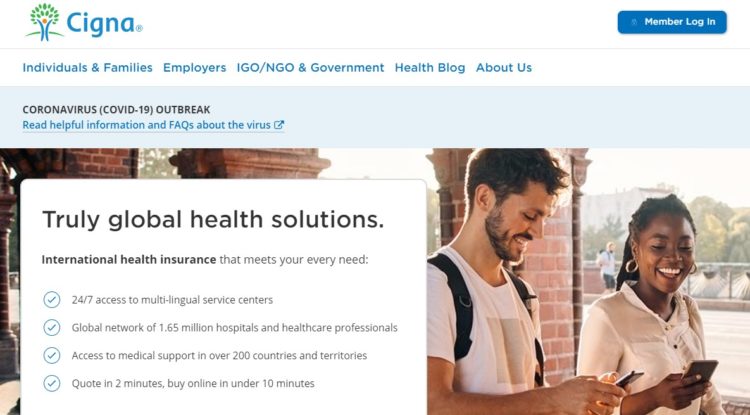
Here are some of the positive and negative points about Cigna.
Pros of digital nomad insurance with Cigna:
- They have flexible deductibles (in other words, you can control what you pay in advance)
- You have flexible payment options (monthly, trimester, or annual)
- You don’t need to request a reimbursement/file a claim since the company will pay your health provider directly
- You have 3 types of plans to choose from: Silver, Gold, Platinum
- The basic plan covers some types of cancer screenings and up to $100 in ophthalmology annually
- They have 24-hour customer service, 7 days a week
- They offer medical coverage in the Middle East
- They have plans that include the transplanting and transportation of organs as well as kidney dialysis treatments
- The company’s website has information about the financial system, culture, and schooling system of the country you’re going to
- COVID-19: Cigna covers all potential costs in the treatment of this illness, in compliance with the protocols recommended by the WHO

Cons of digital nomad insurance with Cigna:
- You have to put in a lot of personal info to get a personalized quote
- If you plan to have a child during your stay abroad, you’ll need to invest in a more expensive policy since the basic plan doesn’t cover maternity help
2. Now Health
Now Health is a bonus option worth mentioning, this company is one of the leaders in the international health insurance market and has been serving clients around the world for years.
Now Health’s main mission is to provide a quality service with clear and efficient communication. Therefore, their customer service is exceptional and one of their main qualities.
Another advantage of this company is its varied plans with customizable options available to its customers with the most varied profiles and needs.

Pros of digital nomad insurance with Now Health:
- Provides coverage in over 190 countries and territories
- Flexible plans with many customizable options
- Options for plans with maternity coverage
- 24/7 service focused on agility and efficiency
Cons of digital nomad insurance with Now Health:
- Some exams and services need to go through the company’s reimbursement system
- To use maternity coverage, you must meet the 12-month grace period of the plan
3. IMG 
Considered to be one of the best health insurance companies for digital nomads, IMG has been working with insurance for more than 30 years.
One major advantage of IMG is that they have global customer service and it’s very easy to get in contact with them. With their live chat feature, you can ask questions about the plans and get answers quickly when you need them.
Nikki and I have personally used the “Patriot America Plus” and “Global Medical Insurance” plans and had a good experience. But like Cigna, we also didn’t need to file a claim with IMG so we can’t speak to this part.

Pros of digital nomad insurance with IMG:
- They have extensive coverage with more than 17,000 doctors and clinics around the world
- There are 5 different plans for you to choose from
- If you use your IMG policy with a health provider outside the United States, you can get a 50% reduction on your deductible
- There are special health insurance plans for overseas missionaries
- There’s an automatic debit payment option
- They have an efficient online portal with access to emergency services available 24 hours a day, 7 days a week
- They have coverage for all nationalities
- The company considers COVID-19 as any other illness and injury, subject to the terms and conditions of the policy
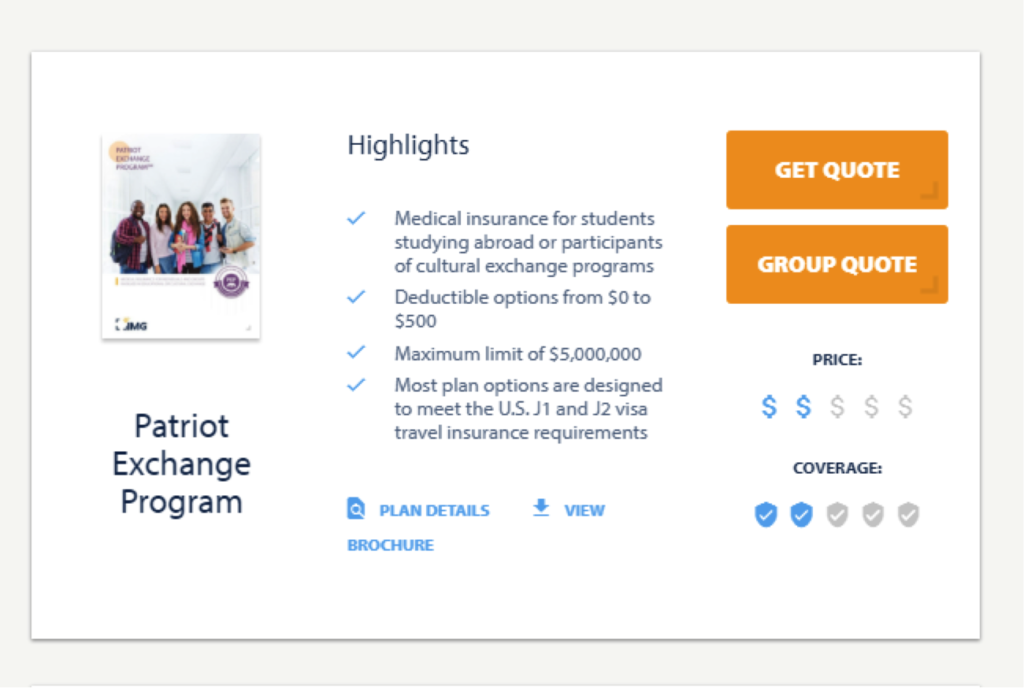
Cons of digital nomad insurance with IMG:
- There’s an age limit with no plans available for adults above 75 (however, if you get an insurance policy when you’re 65+, you can sign up for IMG’s lifetime plan instead)
- Only the most expensive plan offers maternity care coverage (and it only offers it at a minimum of 10 months after your policy has begun)
4. Allianz Care Global Assistance 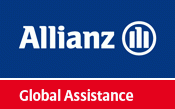
Our final health insurance company on the list today is German insurance company Allianz.
One of the best features about Allianz is that they have a specific program made just for expats.

Pros of digital nomad insurance with Allianz:
- You don’t need to request a reimbursement/file a claim since the company will pay your health provider directly
- They have 24-hour customer service, 7 days a week
- They have a medical phone app that’s available to you 6 months after the start of your contract
- Beyond your plan, they also have a specific program for expats (including info about the specific country you’re moving to)
- They have coverage on all 7 continents
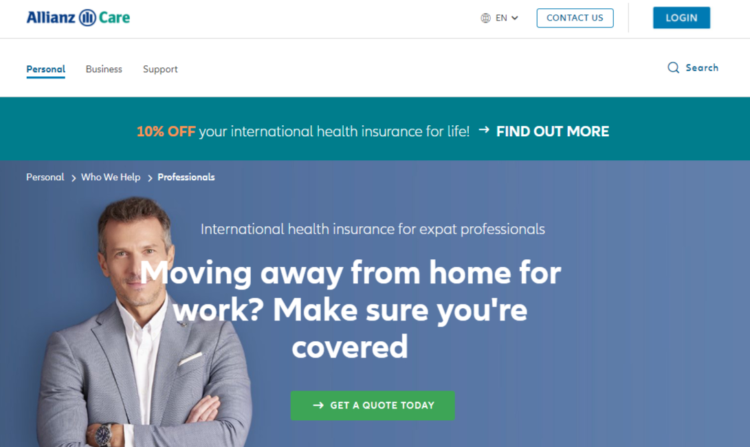
Cons of digital nomad insurance with Allianz:
- You don’t have very many plans to choose from
- Although their website has a lot of info about COVID-19, it doesn’t clarify whether or not they offer COVID coverage
Global Underwriters is another great insurance option for digital nomads, that’s because this company has been in the market for years, always offering plans with different alternatives for travelers around the world.
The most recommended plans for digital nomads are Diplomat Long Term and Diplomat International, in both cases the coverage is very complete and meets the needs of foreigners residing in other countries relatively well.

Pros of digital nomad insurance with Global Underwriters:
- Coverage of up to $1,000,000 in medical care and accidental or dismemberment deaths
- Plans covering medical evacuations, repatriation of remains and emergency dental treatment
- Provides assistance in cases where there are interruptions during your trip due to health reasons or loss of luggage


Cons of digital nomad insurance with Global Underwriters:
- The Diplomat Long Term plan does not have coverage in Cuba, Afghanistan and Iran
- Diplomat International does not provide coverage for covid-19
- The Diplomat Long Term plan does not serve residents of New York, Maryland, South Dakota, Australia and Iran
6. SafetyWing 
SafetyWing is a modern insurance company that has quickly adapted to the innovations in the industry – and has today earned a spot as one of the best insurance providers for digital nomads.
For digital nomads constantly on the move, having insurance that’s comprehensive and adaptable is a must. SafetyWing’s Nomad Insurance Complete plan combines health and travel coverage into one streamlined option, offering peace of mind no matter where your journey takes you.
Why SafetyWing Complete is Perfect for Digital Nomads:
- Comprehensive health and travel coverage: Covers everything from medical emergencies and hospital visits to trip interruptions and evacuation.
- Home country coverage: After every 90 days abroad, you’re eligible for 30 days of coverage in your home country – ideal for those who need to pop back home occasionally.
- Family-friendly benefits: Children under 10 are included at no additional cost, making it great for nomads traveling with family.
- Extra options: Add coverage for dental care, chronic conditions, or mental health support to customize your plan.
- COVID-19 coverage: Stay protected against pandemic-related medical expenses, ensuring peace of mind wherever you are.
- User-friendly experience: Their intuitive website makes enrolling, managing your policy, and filing claims effortless.
The Complete plan is the go-to option for digital nomads who want extensive protection and flexibility. Whether you’re planning a long-term adventure or need robust health insurance to support your lifestyle, SafetyWing Complete has you covered.

Pros of digital nomad insurance with SafetyWing:
- As with the other companies, you can personalize your plan based on your coverage needs
- The website is very functional and gives you a clear idea of how much your plan will cost and how the coverage for each plan works
- They cover children under 10 for no extra charge
- You can add extra services to your policy like dental, maternity care, physical therapy, family medicine, deductible expenses, and outpatient services
- They offer $100 in coverage for repatriation after an evacuation
- If you’re treated at a public hospital free of charge OR if your treatment is covered by another insurance, SafetyWing will give you a daily allowance of $125 per night for up to 30 nights
- They offer full value coverage for cancer treatment and reconstructive surgeries
- They have 24-hour customer service, 7 days a week
- They offer total COVID-19 coverage when recommended by your doctor
- Their website has a fun, playful design which is much easier to use than most of its competitors
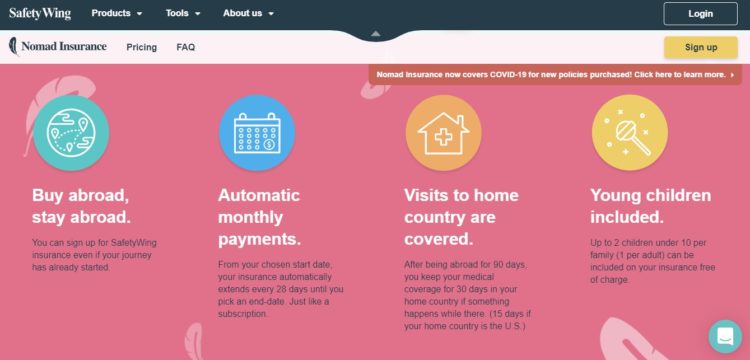
Cons of digital nomad insurance with SafetyWing:
- The quote you see on the website doesn’t include all the fees (to see the final price, you’ll need to create a login)
- The plans that cover the United States, Singapore, and Hong Kong are much more expensive than those for the other countries
7. GeoBlue 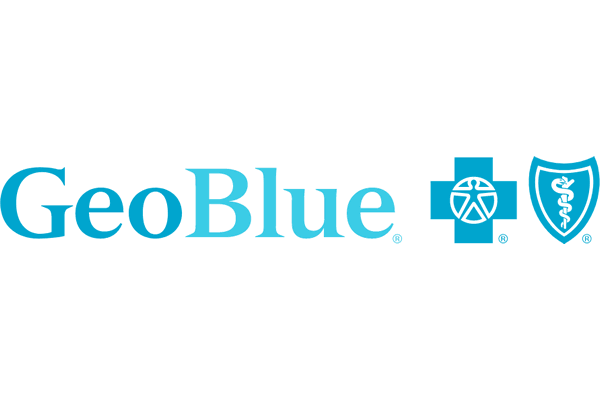
In search of high-quality insurance with extended coverage and class A service? Then GeoBlue is a great option for you!
In an effort to make life easier for those it insures, GeoBlue tries to offer customized service, including a variety of coverage for you to choose from and short- and long-term plans.
Beyond this, GeoBlue also has insurance plans for a wide range of customers such as missionaries, teachers, students, yacht crews, immigrants, or digital nomads.
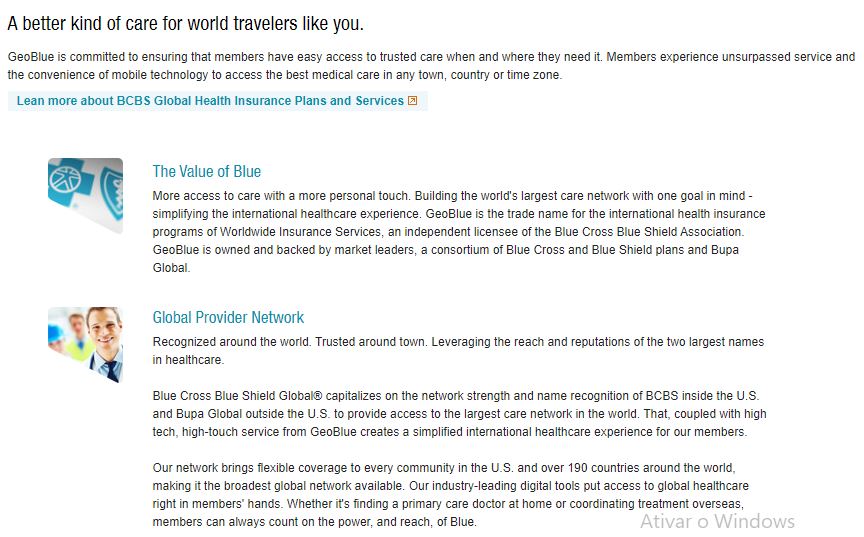
Pros of digital nomad insurance with GeoBlue:
- They have 24-hour customer service, 7 days a week
- They have a wide range of options for plans
- They have plans that cover accidents from extreme sports
- They don’t charge deductible fees for standard services or cancellations, and have unlimited medical service
- They have plans designed exclusively for digital nomads, immigrants to the U.S., and Americans who live overseas
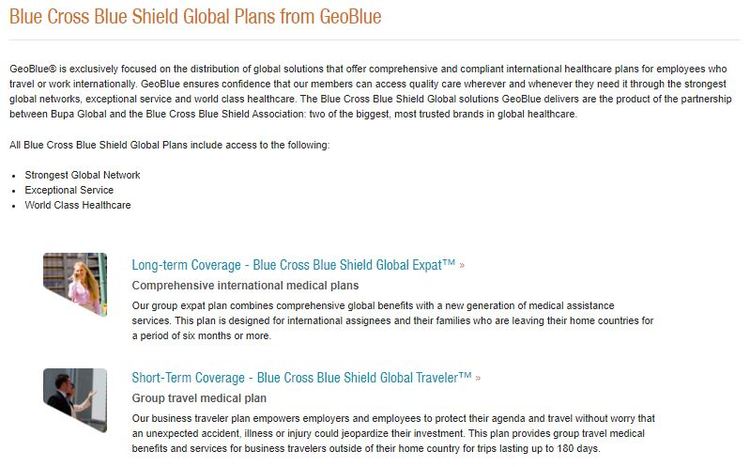
Cons of digital nomad insurance with GeoBlue:
- They don’t offer coverage for individuals who live in New York or Washington
Bonus #1 – Foyer Global Health 
Foyer is a large player in the health insurance world and is one of the largest insurance companies in Europe.
They offer many different types of plans and is an ideal company for digital nomads in search of international travel insurance.

Pros of digital nomad insurance with Foyer Health:
- As with the other companies, you can customize Foyer plans based on your characteristics and medical necessities, such as age, country of origin, dental care, vaccines, maternity, young children, etc.
- You can also personalize your level of coverage for each of these elements from nothing to the maximum coverage
- You have the option of selecting an individual plan or a family plan with or without children
- Unlike many other companies, the process for getting a quote is very simple and you don’t need to give much info
- They have multiple options for deductibles
- They have short-term plans for those who don’t plan to spend a long time overseas
- You can easily compare plan prices and coverage to find the one that’s best for you
- They offer travel insurance for digital nomads anywhere in Europe (and the world)
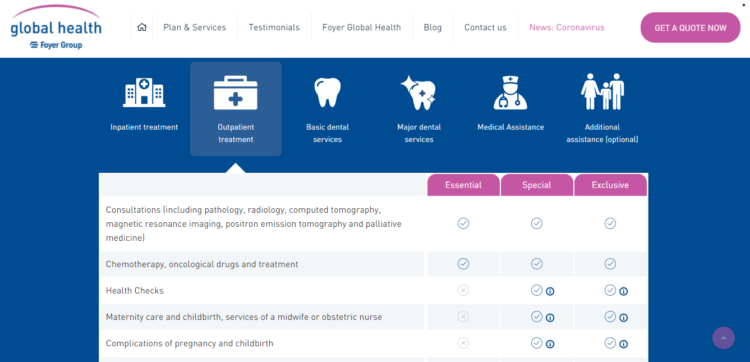
Cons of digital nomad insurance with Foyer Health:
- As with the other companies, Foyer’s most basic plan doesn’t include maternity or newborn care
- Their customer service gets the job done, but isn’t as practical as the others on this list
- The website isn’t very clear about the coverage limits
- Although they have a lot of info about COVID-19 on their website, they don’t make it clear if their plan covers COVID treatments or not
- They charge a 5 euro fee for emergency support
- They don’t have health insurance for digital nomads in the United States (only medical help for emergencies)
Bonus #2 – Aetna (acquired by Allianz)
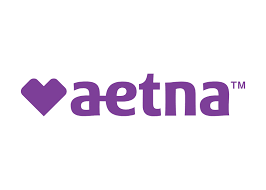
Beyond the quality of the service and its accessible health solutions, Aetna has been in the world of insurance for more than 50 years.
It’s one of the biggest health insurance providers in the United States and has one of the cheapest international health insurances that can be used by digital nomads.
They have a pretty decent customer service team that’s available to help 24 hours a day, 7 days a week.

Pros of digital nomad insurance with Aetna:
- They have plans personalized for digital nomads based on your destinations and coverage needs
- They have 50 years of experience and offices in more than 15 countries
- They have 24-hour customer service
- They’ve been named the “Best International Private Health Insurance Provider” and “Health Insurer of the Year” by various magazines
- Most of their plans include coverage for hospitalization, cancer treatment, repatriation, and emergency evacuation

Cons of digital nomad insurance with Aetna:
- Their site doesn’t offer a lot of explanation about what’s actually included in their plans
Table comparison of the 7 best international medical insurance companies for digital nomads
To help you make the most of all the information I gave you above, here’s a table comparing all the companies I talked about. With the help of the table, hopefully you can have a better idea of which insurance company is right for you for your move overseas.
|
|

|

|

|
|
|||
| BENEFIT | LIMIT | LIMIT | LIMIT | LIMIT | LIMIT | LIMIT | LIMIT |
| Medical Maximum | Unlimited (for the Platinum plan) | $8,000,000 | The site doesn’t specify | Unlimited | US$1,000,000 per year | The site doesn’t specify | Depending on the plan, can be up to $1 million |
| U.S. In-Network Coinsurance | You choose. From 70%(100% thereafter) to 100% | 100% | No | 60% for maximum coinsurance and then 100% | Yes, for higher fees | Only in emergencies | Yes |
| U.S. Out-of-Network Coinsurance | You choose. From 70%(100% thereafter) to 100% | 90% to $5,000 (100% thereafter) | Yes, for higher fees | 100% | 100% | 100% | 100% |
| Mental Health Availability | No waiting period | 12-month waiting period | Co-payment of $25 per visit, waived deductible | 75% up to 40 visits / 60% after that | No | Waiting period of 10 months | Yes |
| Mental Health Benefit | Inpatient and Outpatient: $5,000 lifetime maximum to paid in full depending on the plan | Inpatient and Outpatient: $50,000 lifetime maximum | Co-payment of $250 after deductible | 100% up to 60 days | International and ambulance: limit not specified | Inpatient, outpatient, and therapy: limit not specific | |
| Inpatient Prescription Drugs | $500 to paid in full depending on the plan | Up to $8,000,000 | Yes | Complete reimbursement | Yes | Yes | |
| Outpatient Prescription Drugs | None, unless you buy the International Outpatient Option | Up to $8,000,000 | Complete reimbursement | Yes | Yes | ||
| Evacuation and Repatriation of Remains | Paid in full | Up to $8,000,000 | Yes | Up to $25,000 | No | Up to 10,000 euros | Yes |
| Accidental Death & Dismemberment | Depends on the plan | Rider available, limit depends on age. | $50,000 | It has limitations depending on the plan | |||
| Emergency Dental | Paid in full | Up to $8,000,000 | Optional | 1,000 per year, $ 200 per tooth | Yes, however you need to pay an extra fee on top of your plan | Depending on the plan, it’s unlimited | It has limitations depending on the plan |
| Treatment Necessary as Result of Terrorism | Up to the amount of the coverage | Rider available up to $50,000-lifetime maximum | Clause available up to maximum of $50,000 in lifetime payments | N/A | |||
| Amateur Sports | Unlimited | Rider available up to $10,000 | No | Yes | No | No | N/A |
| Routine Nursery Care of a Newborn Child of a Covered Pregnancy | $25,000 to $156,000 depending on the plan | $1,000 additional deductible, $50,000 lifetime maximum, $200 wellness benefit for first 12 months | Yes | Depends on the plan | Can be unlimited depending on the plan | Depends on the plan | |
| Children born as a result of fertility treatment (such as IVF or surrogacy) | Only after the baby is 90 days old | Excluded | Depends on the plan | Excluded | No | No | |
| Neonatal Intensive Care Unit | Check website for updated information | $250,000 maximum for first 31 days | No | Up to $250,000 for the first 31 days | No | Depends on the plan (Bloom or Bloom Plus) | |
| Pre-existing condition exclusion period | Conditions that are fully disclosed on the application and have not been excluded or restricted by a rider will be covered as any illness | Conditions that are fully disclosed on the application and have not been excluded or restricted by a rider will be covered as any illness | Conditions that are fully disclosed on the application and have not been excluded or restricted by a rider will be covered as any illness | Conditions that are fully disclosed on the application and have not been excluded or restricted by a rider will be covered as any illness | Conditions that are fully disclosed on the application and have not been excluded or restricted by a rider will be covered as any illness | Conditions that are fully disclosed on the application and have not been excluded or restricted by a rider will be covered as any illness | Conditions that are fully disclosed on the application and have not been excluded or restricted by a rider will be covered as any illness |
| Pre-existing condition look back period | Any time prior to effective date | Any time prior to plan effective date | Any time prior to plan effective date | Any time prior to plan effective date | Any time prior to plan effective date | Any time prior to plan effective date | Any time prior to plan effective date |
| Pre-existing annual maximum once covered | Unlimited depending on the plan | Up to $8,000,000 | Unlimited depending on the plan | Unlimited depending on the plan | Full reimbursement | Unlimited depending on the plan | Unlimited depending on the plan |
| Pre-existing lifetime maximum once covered | Unlimited depending on the plan | Up to $8,000,000 | Unlimited depending on the plan | Unlimited depending on the plan | Full reimbursement | Unlimited depending on the plan | Unlimited depending on the plan |
Worldwide Medical Insurance / Comparison Chart*
Part of the table courtesy of Tokio Marine HCC
*Note: this table is just for informational purposes and subject to change. It was accurate as of the time we wrote it here, but please check each company’s individual website for updated info.
Questions to ask yourself before choosing health insurance for digital nomads
And finally, we can move onto the best (and cheapest!) options for international health insurance.
But of course, here’s the question: how do you know which international health insurance plan to choose?
And so, here’s a list of questions to consider before you make your decision:
- What type of coverage does each health plan offer?
- How many hospitals or doctor’s offices are covered in the plan?
- What are you and your family’s specific health needs and pre-existing conditions?
- How good is the insurance company’s customer support?
Let’s go through each of these in a bit more detail.
1. What type of coverage does each health plan offer?
One of the most important things for you to consider when choosing a health insurance plan is the amount of coverage. To know if the coverage is enough for you, here are some extra questions to keep in mind:
- What is the plan’s coverage area? Can you get help in other cities or countries if you’re traveling? If you’re an expat/digital nomad, will the plan cover you in other countries? Does it cover you throughout the entire European Union (EU)?
- Does this plan cover all the types of healthcare or treatments that your family needs?
- Can you personalize your plan?
- How many people can be covered by the plan? What does it cost to add additional members?
2. How many hospitals or doctor’s offices are covered in the plan?
Beyond the overall coverage area, you’ll also want to look at how many hospitals or doctor’s offices will be available to you with your plan, especially if you’re moving to a large city.
The more options you have, the easier it’ll be to schedule appointments, tests, or emergency care (as you can choose the hospital closest to you or the one with the fastest service).
One final tip: there are some international health plans that let you use in-network doctors without paying, and others where you pay at the office and then request a reimbursement (we don’t recommend this latter if you can avoid it since it can be hard to get insurance companies to pay up).
In which case, the greater your plan’s coverage, the better.
3. What are you and your family’s specific health needs or pre-existing conditions?
Most health insurance policies offer some type of specific coverage for pre-existing conditions, but you do need to do your research to see if it covers all that you need it to. Particularly since not all insurance policies have unlimited or free coverage for pre-existing conditions, specific treatments, or even pregnancy.
So if there’s a specific type of treatment or medical care that you think you might need, make sure the plan you’re looking at includes it.
4. How good is the insurance company’s customer support?
Another point for you to take into consideration is the quality of the insurance company’s customer support. In other words, how helpful are they if you actually need to make a claim?
I recommend looking into their response times, successful claims filed, and customer reviews (but one thing to keep in mind here: insurance companies basically always have low reviews, so do take these with a grain of salt).
Also make sure that the company offers 24/7 support (all of the ones below do), so you’re not caught off guard and unable to get help when you need it.
In sum…
Here are the 7 best (and cheapest!) international health insurance companies for digital nomads:
- Cigna
- Now Health
- IMG
- Allianz
- Global Underwriters
- SafetyWing
- Geoblue
In conclusion…
Hopefully, the list above has helped you settle on a health insurance policy so you can now enjoy all the fun parts of being a digital nomad!
Just remember to take some time looking at each of your options in detail and to purchase your plan BEFORE you begin your adventure.
And if you have any final questions about international health insurance, being a digital nomad, or living abroad in general, let me know in the comments area below and I’ll get back to you!









10 Responses
Health insurance in the USA is no longer, and has not been for over a decade, “almost completely private and costs a fortune.” Under the affordable care act, nomads and self employed people can obtain comprehensive health insurance on a sliding scale. Often, for low income people, like a nomad just starting out, it is free. Even people making over $100k per year can but their insurance there and will still pay only about $3-400 per month. Comparable to the plans discussed here.
Hey anonymous – thank you for your thoughts!
Speaking as an American and someone who lives a large part of the year in the U.S., yes, of course, the affordable care act is significantly better than the system before. (Though I might argue that it’s still quite expensive, it’s incredibly difficult to qualify for a free plan, and the “cheap” plans still have deductibles in the thousands of dollars…but that’s a discussion for another day!)
That said, I think there may have been a bit of a misunderstanding here. The article itself doesn’t say the health insurance in the U.S. is almost completely private and costs a fortune. Rather, it says that the *healthcare system* is almost completely private and costs a fortune.
Both of which are true statements (after all, more than 60% of personal bankruptcies in the U.S. are caused by medical debt)…and are thus why we recommend digital nomads who may be spending time overseas get a global health plan so they don’t get stuck paying out-of-pocket for unexpected medical costs.
Beyond that, this article is for digital nomads want to work/travel in countries other than their own. In other words, we really aren’t recommending these plans for Americans to be covered within the United States. Most of our readers would be individuals who are temporarily in the U.S. and are unlikely to be citizens or legal residents and therefore wouldn’t be able to qualify for American insurance plans anyway. Not to mention, they likely also want plans that will cover them in many countries around the world, given that they are nomads. In which case, these plans we recommend in the article are their best choices.